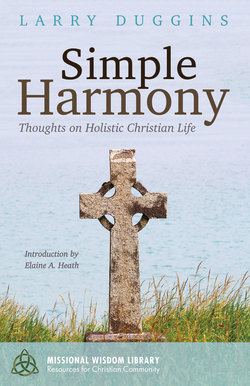Читать книгу Simple Harmony - Larry Duggins - Страница 11
На сайте Литреса книга снята с продажи.
ОглавлениеTradition holds that Maimonides, the famous Jewish rabbi, philosopher, and mystic of twelfth-century Spain, compiled the authoritative list of the 613 mitzvoth or commandments of the Torah. Maimonides searched the scriptures and documented the rules—both the things an observant Jewish person should and should not do in daily life. His efforts reflect an ongoing challenge for Jews and Christians—how does one embrace the Law and the Prophets in such a way that allows them to be fully incorporated into daily life? Are there truly 613 rules that we must remember to please God, and if so, how in the world can we remember them as we live our lives? Are there even more rules to live by when Christian people take the teachings of the New Testament into account?
It is my belief that Jesus dramatically simplified our task of compliance with the Law through his life and his teachings. Jesus frequently argued with the religious scholars of his day for dwelling on the letter of the Law and missing its intent. He criticized leaders who emphasized compliance with the tiny details of the Law while ignoring the overarching theme of God’s love.
The four Gospels are full of examples of Jesus being condemned by religious people for healing people on the Sabbath. It is easy to dismiss those leaders as hypocrites, but I am sure that many of them honestly believed that the Sabbath rules, which were part of those 613 commandments that Maimonides later documented, were to be literally upheld in all circumstances. In modern life, lots of people view Christianity in this way. They either struggle to identify and live under strict rules that they find in the Bible, or they reject Christianity altogether because they are unwilling to live under a set of rules that they don’t really accept or understand. Exclusively focusing on the rules divides people into groups of those who follow and those who do not, and makes it both simple and natural to live life by judging others through our own personal understanding of the rules. I just don’t think that is what Jesus had in mind.
The problem is that many folks use the “rules” to define their understanding of what a Christian person is to do in everyday life. Theologians talk about this issue as the question of human “vocation.” Many people associate the word “vocation” with work, with what we do to earn a living. In this book, I would like to expand our understanding of vocation beyond simply what we do to earn money to a much broader definition that includes what we do in life. Seen this way, vocation is an answer to the oldest of questions: “Why do we exist?”
It seems unlikely that many of us would be comfortable taking a job without understanding what was expected of us in that job. We would want to know our working hours, what tasks would be expected of us, what tools would be available, and what we would be paid. We would spend time and energy before we accepted a job to develop a good understanding of what would be expected of us and what we could expect to receive in return.
Yet, many of us have no idea what a Christian person is to spend their time doing! When asked, most people will say something vague about being good or about loving people, but they cannot put their “job description” precisely into words. The issue becomes even cloudier when folks try to explain precisely how they should go about Christian life, or even why they should live in a certain way. It is no wonder that so many contemporary people have trouble relating to Christianity when Christian people have problems describing what Christian life is all about.
Thankfully, there are scriptures that address Jesus’ teachings on the task of humanity, his approach to acting in the world, and his statement of the goal of his ministry. We can look at those scriptures together to create a simple matrix that illuminates the tasks and spirit of a balanced and healthy Christian life, a life of simple harmony. These scriptures shed light on the balance of doing and being that Christ calls us to embrace. They help us understand what a Christian person is to focus on in daily life, how we are to do those things, and why we are to do them. Scripture helps us understand the human vocation—why we are here in the first place.
